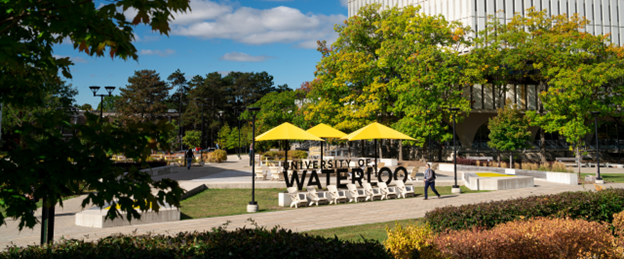
In the Aftermath
The hate-motivated, transphobic attack that happened last June 28th on-campus, has become another point that marks a before and an after. Of course, the events of June 28th have affected everyone across campus. However, they did not affect everyone in the same way. As the saying goes, we might all have been in the same storm, but we were not all in the same boat. Different communities across campus were impacted differently. In 2019, both pre-pandemic and pre-event, the Thriving on Campus study on LGBTQ2S+ Students’ Well-being and Experiences on Campus (n= 640) indicated that Trans students at the University of Waterloo had a more positive perception of sense of safety than Trans students at other Universities across Ontario. [1]
Post June 28th, the sense of safety on campus is not the same--especially for transgender and queer students. [2] As a counsellor, in the days that followed the event, I noticed a sense of uncertainty, fear, and disbelief both in my individual counselling sessions and in my interactions across campus. For members of the 2SLGBTQ+ community, these feelings were heightened.
Minority stress theory asserts that 2SLGBTQIA+ students well-being is directly connected to their environment, and that the higher levels of mental health concerns reported within the queer community can be directly correlated to the stressors from living in a cisgender and heteronormative environment. These environments often create (intentionally or unintentionally) experiences of discrimination, exclusion, and hostility. [1] Or, as I would say if I was sitting in my therapist chair in Needles Hall, “when you are not treated well, and then you are blamed for that mistreatment or asked to minimize yourself or your experiences, it is not surprising that you don’t feel well.” Needless to say, this event substantially lowered the well-being of the 2SLGBTQ+ campus community.
For me personally, there was a sense of grief, as well as a loss of innocence. My perception of safety on campus was gone. Yet, at the same time, things still looked the same, and for the most part business went on as usual. It all felt very ambiguous. One problem with ambiguity is that it makes it difficult to identify, talk about, or even understand how you feel about what happened.
I heard from many students, both in the therapy office and in the community, that they sometimes felt people do not want to talk about the event. These students often found relief when they connected with leaders (staff, professors, peers) that are able to talk about it. As humans, it is common for us to want to avoid uncomfortable topics, especially when we feel we do not have the expertise or the skills to address it. However, ignoring does not help anyone. At its best, avoiding acknowledging the event is dismissive and hurtful to those struggling to navigate the aftermath, and avoidance often adds to the ambiguous grief, anger, and hostile environment created by the event.
Understanding Trauma
It is a well-established amongst trauma researchers and responders that the one-year mark, as well as the weeks and months leading up to the anniversary of a traumatic event, are particularly sensitive periods for those directly and indirectly impacted by the event. As we approach the one-year mark of the June 28th hate crime, there is much we can do to support each other, and specifically the 2SLGBTQ+ campus community.
In counselling we talk about using a trauma-informed lens to help us understand the impact of events like June 28th, as well as to find ways to move forward. A trauma informed lens, is simply understanding how trauma impacts the brain and then colours everything else—the same way the tint in your sunglasses changes the colour of the natural world. It is important to remember that a trauma response is a normal response to an abnormal situation, and it often overwhelms a person’s ability to cope.
The traumatic event itself usually has three common elements:
- It was unexpected.
- The person was unprepared.
- There was nothing the person could do to stop it.
Trauma impacts the brain in many ways and can have both short term and long-term effects on a person. Trauma can lower our stress-tolerance and disrupt emotional regulation and understanding of time. This can impact the person’s ability to complete work or academic tasks.
Trauma can also be both an individual experience, and a community experience. For example, the impact of witnessing the event on June 28th would be an individual experience. An example of a community experience is the feelings of being unsafe, helpless and anger that were echoed by many on campus.
Similarly, post-traumatic growth and healing can also be both an individual and a collective experience. The Standing Together event at 1:00 pm on June 28th 2024 is an opportunity to heal together in community.
When supporting an individual or a community through trauma, we utilize a strengths-based approach that is grounded in an understanding of, and responsiveness to, the impact of trauma. This approach emphasizes the need to re-establish physical, psychological, and emotional safety, and it creates opportunities for all people to rebuild a sense of control and personal empowerment [1].
Moving Forward Together
As we cross the one-year mark, there is still much healing needed. As a community, we need to ask ourselves:
- What does this experience mean for the campus community going forward?
- What does it mean to promote inclusion, reduce minority stress, and enhance the wellbeing and academic development for our 2SLGBTQ+ students?
- How can we best take the next steps to increase and build upon the inclusivity practices we currently have?
From here, we can utilize trauma informed principles in our day-to-day lives. Trauma impacts the ability to regulate our emotions. If a person because upset or frustrated at a simple task, understand that the person’s reaction might not just be about the immediate situation. It might be a result of experiencing ongoing stress or experiences of racism, sexism, or homo/transphobia.
Start by assuming the person is doing the best they can and understand that their reaction is a coping behaviour needed for survival. Engage empathy. Frame questions and statements kindly, being careful not to be judgmental, and wherever possible provide choices and opportunities to collaborate on solutions. Flexibility and multiple options, with nonconfrontational limit setting, are crucial for those working through trauma.
Consider how societal dynamics might affect a person’s well-being and access to resources and create an environment that feels emotionally and physically safe. For those who don’t know what to say or do, it is okay not to know exactly what to do. You can simply listen and thank the person for sharing and trusting you with their vulnerability.
As humans, especially those of us who care deeply, it can be tempting to want to fix the problem or take away the pain. But grief, anger, and trauma are not things we fix. They are things each of us must process. As individuals, we must process our own experiences. We can also process collectively by participating in the many events being held across campus this month.
By listening, validating, and working from a trauma informed perspective we begin the work of re-establishing a sense of community, of organizing individual and collective thoughts and feelings, of moving away from feeling helpless and overwhelmed, to a place of self-efficacy and action. A place where we can once again feel empowered and move forward. Together, as a campus community, it is possible to create spaces that encourage post-traumatic growth, where those who are still experiencing cognitive and emotional struggles from the event can experience healing and emerge, changed, on the other side of the experience.
You are invited to attend the upcoming lunch and learns being offered by Counselling Services on June 19th (in-person) and June 24th (online), where you will learn more about how to apply these principles to better support our campus community. For more information on these lunch and learns and other Pride events, see the Celebrating Pride webpage.
